

Sub-Saharan Africa Planning and Design Scholarship Opportunity
Starting from 2016, the Department of Urbanism of the TU Delft provides one partial scholarship to students from Sub-Saharan Africa aged between 21 and 26 to participate in the Summer School.
From 2017, Delft Global Initiative will provide one scholarship for one excellent African student to attend the Summer School. The scholarship covers the travel costs and daily costs during the Summer School (food and transportation). Accommodation is provided separately. The first recipient of the Summer School Scholarship was Fitsum Abera Angasa from EiABC. Students interested in the program shall express their interest to Ms. Eva Pressl, This email address is being protected from spambots. You need JavaScript enabled to view it.
More information: https://summerschooltudelft.org/scholarships/
1st Ethiopian Landscape Forum Addresses Need for Action
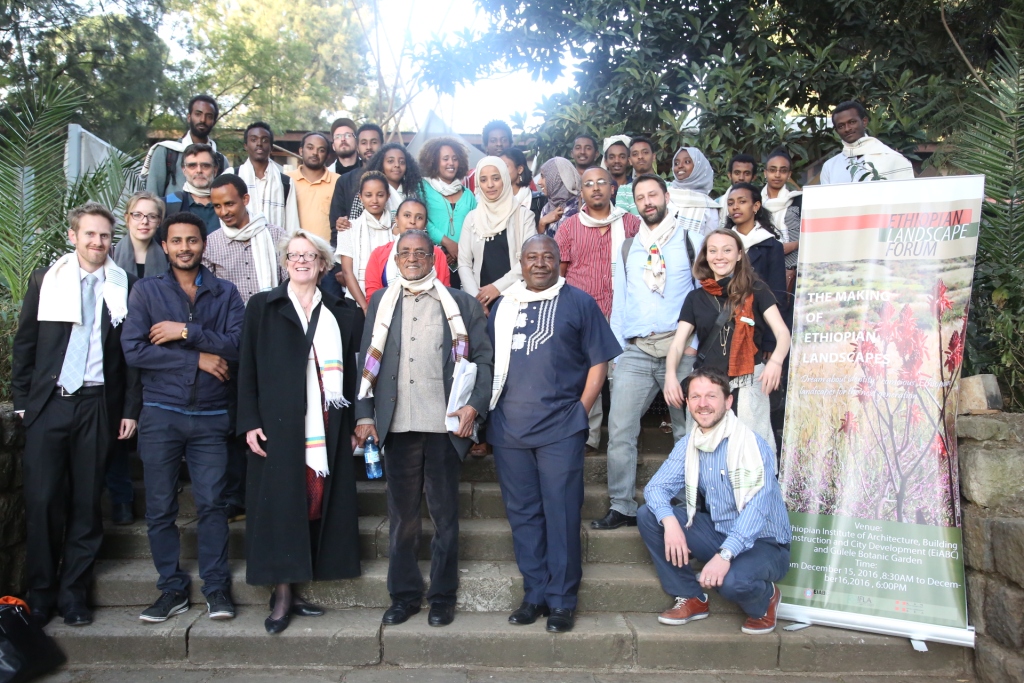
Entitled ‘The Making of Ethiopian Landscapes’ the 1st Ethiopian Landscape Forum, held from December 15th to 16th at EiABC brought together national and international experts to discuss the role that landscape architecture can play in shaping Ethiopia’s future urban, social, rural, academic, touristic, agricultural, forest, and river landscapes.
Prof. Kathryn Moore, President of the International Federation of Landscape Architects (IFLA), illustrated how landscape shapes cultural identity. ‘Landscape is the relationship between community and landscape. It’s about how people use the everyday landscape and how people experience places.’, she said. Landscape must be viewed in a holistic way. Also because the quality of landscape shapes employment, housing, health, tourism, economy and other, but often is a blind spot. In her opinion landscape should be considered as a developmental philosophy. ‘We have to think long-term and have a vision. We must ask ourselves ‘What is the cost of doing nothing?’ and change the view of governments on how to deliver infrastructure. We must give everyday landscapes a voice.’ A step towards this could be the signing of the ‘Global Landscape Convention’ that will be presented during the World Design Summit in Montreal in 2017.
‘Think global, act local’ is how Prof. Tunji Adejumo, President of the African Branch of IFLA, sees the role of landscape architecture. ‘Most of today’s problems have no boundaries. Think about the effects of climate change that lead to desertification or floods as well as other problems such as migration or political crises.’ Every country has an identity, a landscape where they work, live and play. The landscape is made up by human factors such as religion, social context, and urbanisation and the ecosystem that includes fauna and flora. ‘We as landscape architects must see the overall picture and then act locally. We are local solution providers and must design in harmony with the biosphere of the planet and the global ecosystem.’ Prof. Tunji summarized.
During the two days of the event altogether 12 presenters highlighted various aspects of landscape architecture. Amongst them distinguished speakers such as the former Environment Minister, Tewolde Berhan Gebre Egziabher, who elaborated on the results of the 2015 United Nations Climate Change Conference, COP 21, or Ato Wondwossen, Chairperson of the Association of Ethiopian Architects, AEA, who emphasised that landscape architecture is a crucial issue in Ethiopia that should receive more attention and that that could maybe be helped by establishing an institute or a professional association. Two more international speakers, Graham Young from the University of Pretoria in South Africa and Andreja Tutundzicfrom the University of Belgrade in Serbia presented examples of landscape projects and spoke about the education of landscape architects in their respective countries. Joachim Dieter, Scientific Director of EiABC, pointed out that EiABC was the only institute in the Horn of Africa region that offered a master’s degree program in landscape architecture.
In addition to the speeches and discussions, an exhibition of contemporary landscape architecture works from across the African continent was shown aiming at highlighting the potential of landscape architecture in regards to its contribution to development. Following the exhibition, the works will be collated into a book entitled ‘Crafting African Landscapes’.
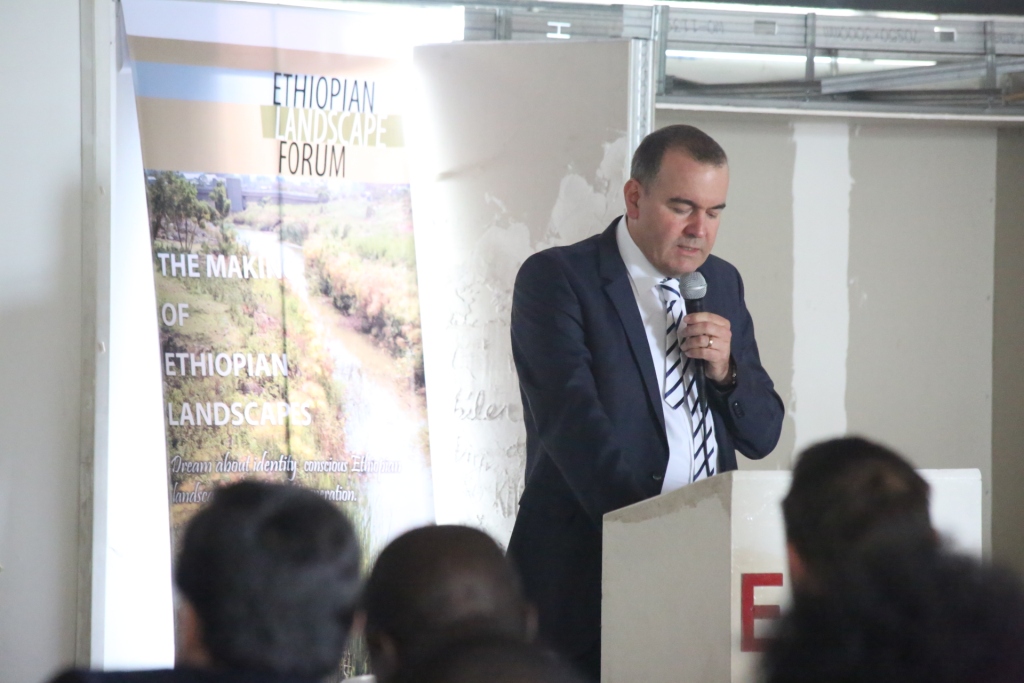
EiABC Hosts 4th ESRI Conference at the Economic Commission for Africa
The Environmental System Research Institute (ESRI) East Africa Education Geographic Information System (GIS) Conference was first held at Kenyatta University, Kenya, in 2013. Since then ESRI continues to attract GIS professionals from East African universities and participants from local and international organizations.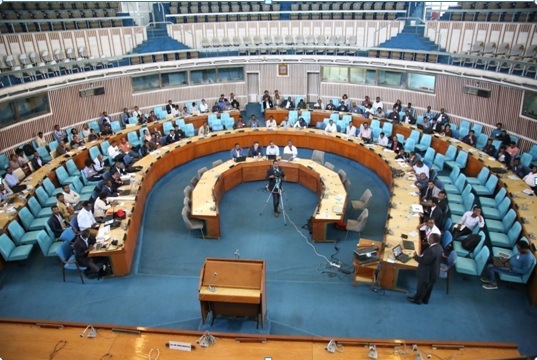
ESRI conference at the Economic Commission for Africa (ECA)
The 4th ESRI conference was held at the United Nations Economic Commission for Africa in Addis Ababa on September 23 – 24, 2016. Its objective was to create a world of opportunities through GIS, Web GIS and Geo database management system. More than 300 professionals and experts from different universities from Ethiopia, Kenya and other East African countries participated.
Joachim Dieter, Scientific Director of EiABC, opened the 4th ESRI conference by welcoming all the participants. Joachim mentioned that such kind of a regional conference was a good opportunity to share experience and knowledge in the area of Geographic Information System (GIS). He also mentioned that GIS professionals have the responsibility to work on developing different software, which can help campuses to be interconnected. They should also make an effort to develop GIS Maps for other professionals so that they can apply the findings of the research and come up with real world solutions using the GIS maps.
1st ETHIOPIAN LANDSCAPE FORUM, 15th and 16th December, 2016
On 15th and 16th December, 2016, the Ethiopian Institute of Architecture, Building
Construction and City Development (EiABC) by the initiative of the Chair of Landscape Architecture will host the 1st Ethiopian Landscape Forum together with IFLA, the International Federation of Landscape Architecture. Landscape architecture is a design field which deals with the spaces between building and roads and aims to build a holistic relationship between ecosystems and the built environment.
Thefirst quarter of the twenty-first century is threatened by three global phenomena namely the high rate of urbanization, erratic climatic anomalies and terror driven by human migration. The positive and negative impacts of their these phenomena are continually etched on global landscapes. Landscape is a spatial entity that evolved over a period of time as a result of natural and cultural processes interaction. Natural processes refer to a bio-geomorphic system, while cultural processes are the sum total of human systems grafted on the environment for economic, social, recreational, transportation, military, religious and agricultural purposes. These usages create diverse landscape features, which in turn are responsible for diverse human adaptations for survival in a bioregion. Dynamic developmental economic survival has in recent years become the destructive stripping of natural landscapes of their originality and distorting precious cultural landscapes. This is being compounded by climate change phenomenon, urbanization and environmental injustice. Global players look in the direction of UNESCO International Landscape Convention; United Nations Habitat III; and Conference of Parties (COP) for solutions. The later, ‘COP’, stands for 196 signatories of United Nations Framework Convention on Climate Change (UNFCCC).
Ethiopia is conscious of its urban and rural landscapes and was one of the first countries to submit its Intended Nationally Determined Contribution to the UNFCCC with interests on developing a green economy and meeting food security within its rapidly growing urban centres. Though Ethiopia’s 16% urbanization seems low compared with other global south nations, the worry is what will influence our urban morphology, especially the desired public realm, green, grey and blue infrastructures? The October 1st UN Habitat III gathering in Quito, Ecuador was about an urban paradigm shift reflecting on the ‘cities we need’, This paradigm shift sees landscape as a human construct showing dialogue that occurs between human and ecological processes, as expressed in the UN 2015 Sustainable Development Goals. Our national landscape of today evolved from the decisions made in yesteryears. The decision for tomorrow’s landscapes is being made now. What type of Ethiopian urban, social, rural, academic, touristic, agricultural, forest, river landscapes do we want tomorrow? What intellectual capacity building do we give to Ethiopian youths that will develop, manage, and preserve these landscapes? Your opinion matters. Please join us to dream about identity conscious Ethiopian landscapes for the next generation.
EvenInfo->http://eiabc.edu.et/index.php/ifla-conference
click Here to download IFLA Schedule.
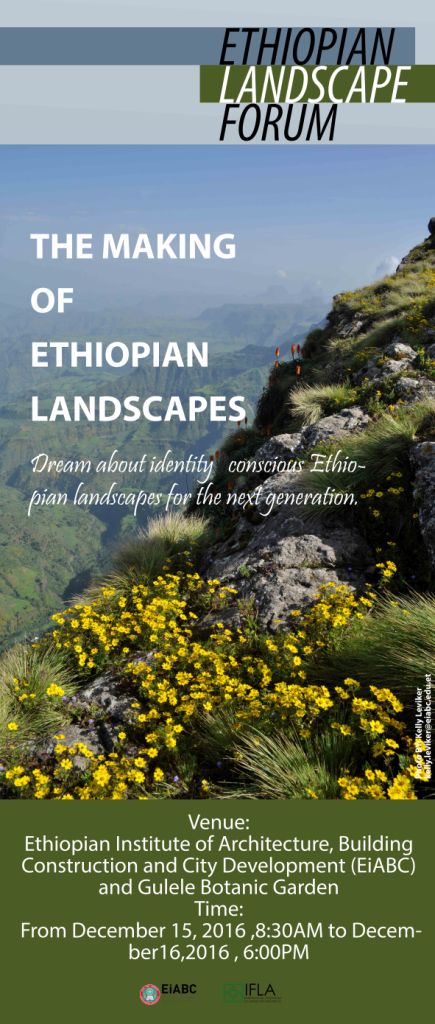
Since 1964 GIZ has been working in Ethiopia on behalf of the German Federal Ministry for Economic Cooperation and Development. Together with the Ethiopian government GIZ is very much engaged in the university capacity building program.
On 12th October, 2016, a group of high level GIZ delegates led by Ms. Tanja Goenner, Chair of the Management Board of GIZ,visited the EiABC campus. The objective of the visit was to look at the success achieved and the challenges faced by GIZ in its institutional capacity building program.
Ethiopian Institute of Architecture Building Construction and City Development (EiABC) Scientific Director Joachim Dieter, gave a warm welcome to the delegates and briefly explained about how the institute was established in collaboration with the Swedish government in 1954. He also presented its expansion and the developments and challenges that it passed through since then.
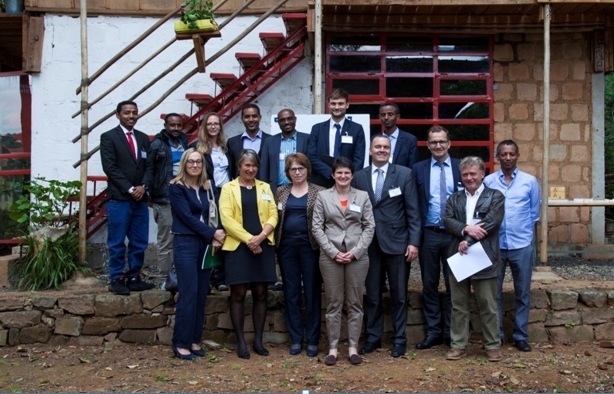 High level GIZ delegates visit EiABC campus
High level GIZ delegates visit EiABC campus
Joachim also stated the efforts made to develop partnerships with international universities to bring research based MA and PhD programs to the students, which can make them play a greater role in the development of the architecture, building and construction sector. He also mentioned the contribution GIZ is making towards the capacity building of higher education institutions.
The Director of Quality Assurance, Dr. Abebaw Yirga, mentioned the achievements and challenges faced in ensuring quality in higher education. According to Dr. Abebaw, new innovative templates, induction courses for new staff, the Higher Diploma Program (HDP) training and curriculum reviews have been prepared by the quality assurance directorate. Yet despite the efforts, quality is still not assured because of the lack of an established team working on quality assurance as well as the lack of cooperation amongst academics, who fail to accept the teaching profession as profession in itself and the lack of no institutional policy regarding quality. As a result of this and other factors he said we fail to “walk the walk.", but we keep working on it.
Birhanu Tsegaye, A/Director of Center for Entrepreneurship, presented on the efforts that were made with local subsides and the contribution GIZ to become a center for excellence in entrepreneurship. In addition Abel Hailegiyorgis, student at EiABC, presented his bamboo wheelchair project, which is believed to be able to reach many people with low income if more research and marketing are made.
The GIZ delegation also discussed with Prof. Dirk Donath on the ongoing low cost housing project funded by GIZ. After their visit the GIZ delegation promised to further strengthen their cooperation with EiABC and to work hand in hand with the institute for the sustainable development of the country.
SAPE ERROR: Нет доступа на запись к файлу: C:\inetpub\wwwroot\templates\eiabc\images\cache\005e1c30997002fbe5298dd1be4e0c74/links.db! Выставите права 777 на папку.